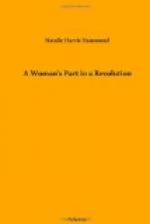One day the ‘Star’ (in a third edition) announced the great decision was at last concluded. The sixty-three Reformers were to be divided into four groups and sentenced in lots. Ten were to be liberated because of ill-health. Some were to be imprisoned twelve months, others five, and still others three months. The four leaders were sentenced to fifteen years’ imprisonment, which, if carried out, was equivalent to death. However, this sentence was provisional, and it was understood petitions would be entertained.
This news was first taken into the jail by two wives who had outrun the messenger. My husband says that when he saw Mrs. X. throw herself weeping and speechless into her husband’s arms, he thought ’it was all up with him.’
X. wasn’t half the offender he was, and the sentence was evidently something too dreadful to tell. Mr. X. was one of the three months’ men, I believe.
These sentences, although unpopular, relieved to a certain extent the awful strain. But what was Johannesburg’s wrath to hear two days later that the sentences were not for the periods mentioned, but that at the expiration of these periods the prisoners could make fresh applications to be again considered! This was juggling with human souls! Everybody believed it to be the work of Dr. Leyds. A man more execrated than Dr. Leyds, I believe, does not live!
Three more weeks of cruel suspense followed.
Mr. Chamberlain continued to tumble down the Boer back stairs head over heels, yelling out excuses as he descended. He publicly denied on the 29th that Great Britain had promised to protect the Reformers, and added that they were not being unfairly treated. I will never make statesmen of my sons. I’d rather set them to ploughing.
Mark Twain came to the Rand. He visited the men at Pretoria. My husband did the honours of the prison, and introduced him to the Reformers. He talked a long while to them, sitting on a dry goods box. Expressed his satisfaction at finding only one journalist in the crowd, and no surprise that the lawyers were largely represented. He assured them that they were to be congratulated and envied, although they did not know it. There was no place one was so safe from interruption as in a jail. He recalled to their minds Cervantes and Columbus—it was an honour to share captivity with such men as these.
They have sent another member of the Executive away to the baths, and later his absence will be given as an excuse for delay.
MAY 30.—All the Reformers with the exception of Davies and Sampson, and the four leaders, are released after paying ten thousand dollars each, and giving their oath to abstain in future from discussing or participating in Transvaal politics.
JUNE.—Meetings are called by the labourers on the Rand. They send a monster petition to Pretoria. The miners and mechanics also send a petition. The famous Innes petition is being circulated all over South Africa, and the mayors of all the large towns are preparing to go in a body to Pretoria to present their petitions for the release of the leaders. The President promises and postpones from day to day. The retention of the leaders is acknowledged to be only a question of the amount of fine.




